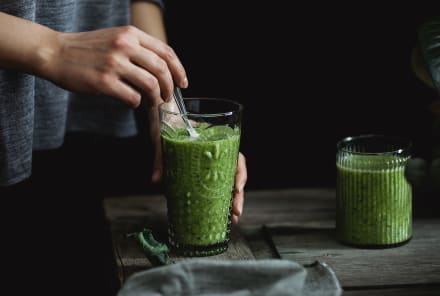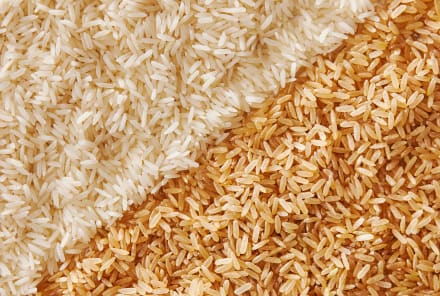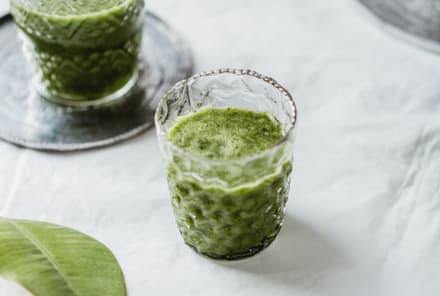Advertisement
Can Olive Oil Really Help When You're Feeling Constipated?


Long before olive oil became a pantry staple for dressings and marinades, it was used for various other needs. Historically, the benefits of olive oil go beyond the culinary and beauty worlds and extend into health. One medicinal benefit you may be less familiar with is using olive oil to help move the bowels.
Before you write it off, here's the research behind how olive oil can be used for constipation and how to get started consuming it for this purpose.
Can olive oil help relieve constipation?
When considering what might immediately improve constipation, olive oil is likely not your laxative of choice. In fact, other oils (i.e., castor oil1 or flaxseed oil2) have better data supporting their ability to improve symptoms of constipation. However, research shows that olive oil does have mild laxative effects—enough to be beneficial for someone struggling to pass hard stools.
One study found that patients undergoing dialysis were able to alleviate constipation by consuming olive oil daily3. Another study suggests that when paired with almond oil, olive oil can be used as a softening agent4 to help stool pass more effectively. Additionally, in kids with severe, chronic constipation, olive oil enemas5 may be useful, according to a 2021 review article in the Journal of Pediatric Surgery.
How to use olive oil for constipation
I recommend buying extra-virgin olive oil (EVOO) if possible because it's minimally processed, cold-pressed, and unrefined—meaning you're getting the purest oil without any added chemicals. It also tends to have more antioxidants than the more processed varieties, so while you're consuming it, you will reap the anti-inflammatory and free-radical-fighting benefits.
Because olive oil is not an over-the-counter medication like some other laxatives, there is no standard dosage to keep in mind when using it for constipation. I recommend starting with the general serving size, which is 1 tablespoon per day. You can drink it on its own or incorporate it into your smoothies, salad dressings, or even coffee.
If you use olive oil in your salad dressing and again roast your veggies later, it's possible that you might exceed just 1 tablespoon, and that's OK. Just try not to eat an excessive amount in one day as it could potentially cause diarrhea or stomach upset (it does help you poop, after all!).
Tips for using olive oil for constipation:
- Buy organic extra-virgin olive oil if possible
- Start with consuming one tablespoon per day
- Drink your EVOO it on its own as a shot, or try it in smoothies, coffee, or salad dressings
- Monitor your intake to avoid stomach upset
Summary
Is it safe for everyone?
Eating a moderate amount of olive oil is generally considered safe for anyone (unless you have an allergy to olives or olive oil, which is rare). Just be careful not to overcorrect your constipation by eating too much olive oil, as it might result in diarrhea.
And since studies have shown that olive oil may lower blood sugar levels6, be sure to talk to your doctor if you're diabetic or have insulin resistance to make sure you're staying within a healthy range.
Summary
What causes constipation in the first place?
According to the U.S. Department of Health and Human Services, constipation is defined as an inability to pass three stools in one week, and when they do pass, the stools are hard, uncomfortable, and painful. (Curious what your poops should look like? Check out this primer.) There are several reasons for constipation, including:
- Dehydration
- Imbalance in the gut microbiome
- Food sensitivities or allergies
- Certain medications
- A lack of fiber in the diet
- Traveling
- Ignoring the urge to poop
What causes another person's constipation may be different from what's causing yours. If you have chronic constipation, it's important to work closely with a doctor or gastroenterologist to understand the root of the problem and how to address it appropriately.
Summary
Other things that may help relieve constipation
If olive oil is already a part of your daily diet, and it doesn't seem to be enhancing your digestion, here are a few other tried-and-true methods that may help:
- Drink more water: Dehydration can lead to constipation, so be sure to drink water throughout the day and consider adding in some electrolytes.
- Eat plenty of fiber: Fiber is a potent prebiotic that can get things moving quickly. Leafy greens, colorful vegetables, whole grains, flaxseeds, and chia seeds are all examples of fiber-rich foods. If fiber isn't part of your regular diet, start slowly, as the introduction of gut-healthy microbes can sometimes upset the stomach.
- Consume more probiotics: Eating probiotic-rich foods or taking a daily probiotic supplement can help support a healthy and balanced gut microbiome.
- Move your body: Not getting enough physical activity is one cause of constipation. Exercising daily will get your GI system and bowels moving.
- Belly massage: Some osteopathic manipulative techniques are amazing at getting your bowels moving. Try this: Press your hands into your belly, starting from the small intestine, moving up your abdomen, then down your abdomen, following the large intestine in a circular motion. Read a more detailed step-by-step guide to this belly massage here.
- Supplement: Some supplements, like magnesium citrate, may help with digestion. Talk to your doctor to find out if these options are right for you.
The takeaway
Olive oil is a delicious pantry staple with numerous health benefits—including mild laxative effects. Consuming 1 tablespoon of olive oil a day may help ease constipation. Be sure to drink plenty of water, move your body, and eat a nutritious whole-foods diet to further get things moving. Curious for more ideas on how to promote healthy bowels? Here are 15 more foods that can help you poop.
Watch Next
Enjoy some of our favorite clips from classes
Enjoy some of our favorite clips from classes
What Is Meditation?
Mindfulness/Spirituality | Light Watkins
Box Breathing
Mindfulness/Spirituality | Gwen Dittmar
What Breathwork Can Address
Mindfulness/Spirituality | Gwen Dittmar
The 8 Limbs of Yoga - What is Asana?
Yoga | Caley Alyssa
Two Standing Postures to Open Up Tight Hips
Yoga | Caley Alyssa
How Plants Can Optimize Athletic Performance
Nutrition | Rich Roll
What to Eat Before a Workout
Nutrition | Rich Roll
How Ayurveda Helps Us Navigate Modern Life
Nutrition | Sahara Rose
Messages About Love & Relationships
Love & Relationships | Esther Perel
Love Languages
Love & Relationships | Esther Perel











